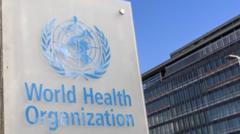President Trump's executive order to initiate the withdrawal from the WHO may dismantle nearly a fifth of the organization's budget, raising serious concerns about the future of global health initiatives. Public health experts warn this move could hinder urgent responses to diseases and empower other nations, particularly China.
Potential US Withdrawal from WHO Raises Flags on Global Health Readiness

Potential US Withdrawal from WHO Raises Flags on Global Health Readiness
The recent executive order signed by President Trump to withdraw the United States from the World Health Organization could jeopardize public health funding and international response capabilities.
In a bold move on his first day back in office, President Donald Trump signed an executive order aimed at withdrawing the United States from the World Health Organization (WHO). This decision signals a significant shift in America's international health policy and raises concerns over the funding and resources available for global health crises. Previously, Trump had initiated the withdrawal during the height of the COVID-19 pandemic, criticizing the WHO for what he perceived as favoritism towards China in its pandemic response. Although President Joe Biden reversed the decision during his tenure, the reissuing of this executive order suggests a renewed commitment from Trump to diverge from the international health body.
The order claims the U.S. withdrawal is based on the WHO's alleged mishandling of the pandemic, its failure to enact necessary reforms, and its susceptibility to political influence from member states. Notably, the U.S. contributes nearly 20% of the WHO's budget, which totals approximately $6.8 billion. Experts fear that this funding gap could emerge almost immediately, leaving the organization ill-equipped to tackle future health emergencies such as Ebola, MPOX, or even another pandemic akin to COVID-19.
Public health authorities have stressed the potential adverse effects this withdrawal could have on not only global health efforts but also American health security. Ashish Jha, the former COVID-19 response coordinator under Biden, indicated that the decision might harm global health and weaken U.S. scientific leadership. Lawrence Gostin, a Georgetown University global public health expert, described it as a "cataclysmic presidential decision" that could lessen the effectiveness of the WHO and erode the United States' influence in global health matters.
While proponents of the withdrawal argue that it might catalyze necessary reforms within the WHO to better meet public health needs worldwide, skepticism remains regarding whether such reforms would be enough to persuade the U.S. to return. The language coming from Washington points towards a firm resolve to distance itself from the organization, leaving the future of U.S.-WHO relations uncertain.
As the world grapples with ongoing health challenges, stakeholders are left to ponder the repercussions of a potential U.S. withdrawal on international collective health efforts—fostering fears of increased vulnerability and exacerbated global inequities.





















